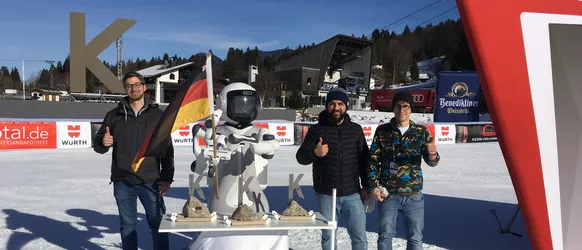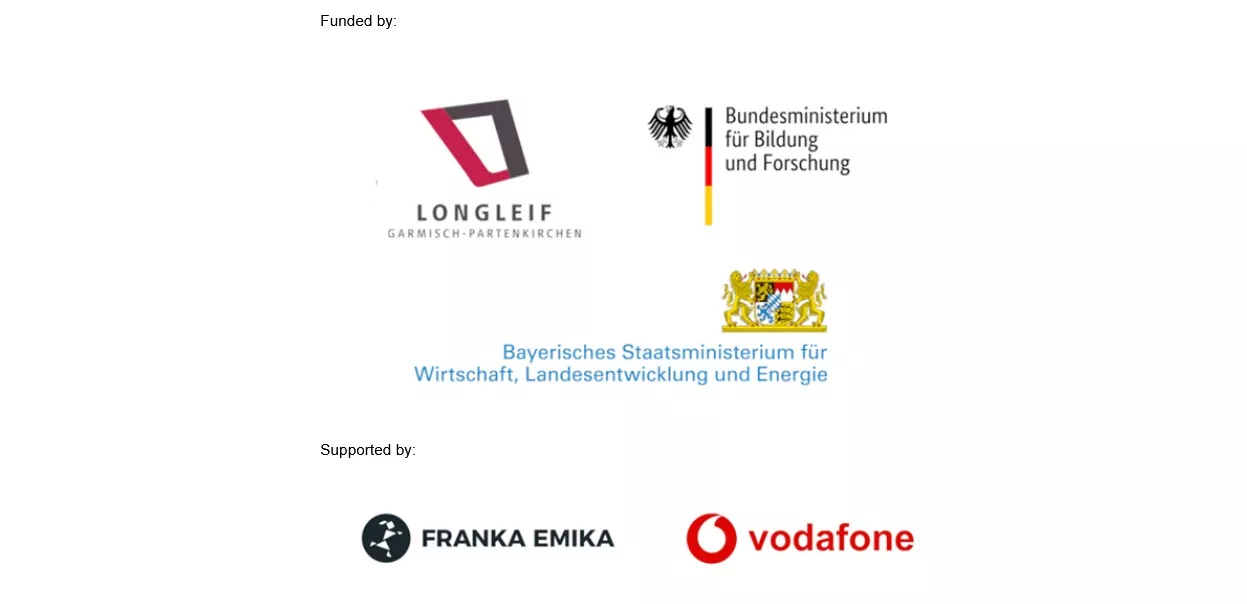TUM Press Releases
Premier of GARMI on snow
Health, Research |

"GARMI" is a service humanoid that has been under development at the Technical University of Munich (TUM) since 2019 with the purpose of supporting elderly people and those in need of care. The robot assistant is part of Geriatronics (Geriatronik in German), a concept that refers to the interplay of geriatrics or gerontology (the science of ageing) and robotics with preventive, outpatient and inpatient care of the elderly and old people. “Everyday tasks such as picking things up from the floor, opening doors, simply brushing one's teeth or shaving, suddenly present insurmountable obstacles in old age and with increasing frailty. The aim of Geriatronics research is to maintain the independence and mobility of people in need of care for as long as possible. This includes supporting them in their daily lives and also facilitating easy communication with the outside world. It makes it possible to relieve the nursing staff and thus create more time again for intensive human-to-human interaction”, explains Prof. Sami Haddadin, Founding Director of the Munich Institute of Robotics and Machine Intelligence (MIRMI) of the Technical University of Munich (TUM), where Geriatronics is one of the institute’s lighthouse initiatives.
In this occasion, and for the first time, GARMI developers plan to use it to avoid COVID-19 contagions by handing over the trophies to the winners of the Ski World Cup at the Alpine city of Garmisch-Partenkirchen, Bavaria, Germany. Usually at award ceremonies there is someone to present the award to the winners. Due to the pandemic, this tradition cannot be continued. As Garmisch-Partenkirchen is the home of GARMI as well as the host city of the competition, the organising committee thought of GARMI as an ideal option to hand over the trophies while guaranteeing the safety of the athletes. “When the organising committee contacted us, we got excited about having an exciting new field of application for GARMI and exploring its possibilities in a challenging outdoor environment. So we organised an exclusive team to analyse the requirements” says Dr.-Ing. Abdeldjallil Naceri, Senior Scientist at the Research Center Geriatronics.
GARMI will present the trophies at the finish area of the world-famous ”Kandahar” Alpine ski track. “This is a novel challenge for GARMI: Each trophy weighs around 5 kg approximately. This means, GARMI has to lift it up with both hands and keep it stable while standing on an uneven surface… The temperature is another factor. This is the first time GARMI operates in the outdoor winter cold. Fortunately, our tests have shown good results so far”, explains Dr. Naceri. Additionally, “the time is limited'', adds Dipl.-Ing. Mario Troebinger, “we have only 10 minutes to bring GARMI to stage and run it. And each trophy must be handed over in 5 seconds.” This experience has brought several learnings for the team. “With the participation of GARMI in the SKI World Cup, we have the opportunity to verify and improve the system performance, increase the robustness of the system, improve the control algorithm that makes the system capable of learning, and we are designing different levels of autonomy for the system. However, for now the robot cannot operate if there is snow or rain” clarifies Dr.-Ing. Hamid Sadeghian.
Garmi's participation opens a new world of ideas about the needed specifications that a service robot should have to be able to assist someone in the future while being outdoors, like in the backyard of the house. The core research team consisting of Dr.-Ing. Abdeldjallil Naceri, Dr.-Ing. Hamid Sadeghian, Dipl.-Ing. Mario Tröbinger, Matthias Richter, and Xiao Chen does not discard similar use cases as during the Ski World-Cup of GARMI in the future. However, for now, GARMI’s development will keep its focus on supporting the elderly and caregivers.
GARMI is a robotic assistance system whose basic equipment was developed by the Munich-based company Franka Emika and is further developed as a research platform by TUM. Research is carried out within several TUM research projects in Munich and Garmisch-Partenkirchen. The following partners participate in or support the development of GARMI:

Receive our featured stories, news, events, and videos in your inbox every month, subscribe here!